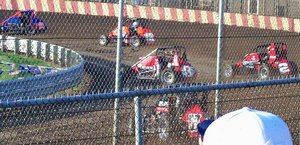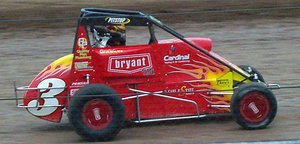Difference between revisions of "Midget car"
m |
m |
||
| Line 11: | Line 11: | ||
==History== | ==History== | ||
| − | Midget car racing was invented at the [[Gilmore Stadium]] in May 1934. | + | Midget car racing was invented at the [[Gilmore Stadium]] in May 1934. It flourished at the track, and continued after the track closed in 1950. Midget car racing spread to many parts of the world. Other major tracks in the United States operating in the first half of the twentieth century include [[Angell Park Speedway]] in [[Sun Prairie, Wisconsin|Sun Prairie, Wisconsin]] (near [[Madison, Wisconsin|Madison]]), and [[Ascot Park]] near Los Angeles. |
==Stepping stone to high profile divisions== | ==Stepping stone to high profile divisions== | ||
Revision as of 18:25, 16 April 2008
- This article is about full-size midget race cars. For the smaller version youth racer, see Quarter-midget. For the British sports car with its own race series it's the MG Midget.

Midget cars are very small race cars with a very high power-to-weight ratios and typically using four-cylinder engines. Despite their name, they are fully capable of being driven by average-sized drivers.
Cars
Typically, these cars have in excess of 250-300 horsepower, and weigh only 1000 pounds. The high power and small size of the cars combine to make midget racing quite dangerous; for this reason modern midget cars are fully equipped with roll cages and other safety features. They are intended to be driven for races of relatively short distances, typically 2.5 to 25 miles (4 to 40 km), often staged inside arenas, most notably the Chili Bowl Midget Nationals held in early January at the Expo Square Pavilion in Tulsa, Oklahoma.
History
Midget car racing was invented at the Gilmore Stadium in May 1934. It flourished at the track, and continued after the track closed in 1950. Midget car racing spread to many parts of the world. Other major tracks in the United States operating in the first half of the twentieth century include Angell Park Speedway in Sun Prairie, Wisconsin (near Madison), and Ascot Park near Los Angeles.
Stepping stone to high profile divisions
Many IndyCar and NASCAR drivers used midget car racing as an intermediate stepping stone on their way to more high profile divisions, including Tony Stewart, Jeff Gordon, and others. The events are sometimes held on weeknights so that popular and famous drivers from other, higher-profiled types of motor racing will be available to compete, and so that it does not conflict with drivers' home tracks.
Notable midget car races
In 1959 Lime Rock Park held a famous Formula Libre race, where Rodger Ward shocked the expensive and exotic sports cars by beating them on the road course in an Offenhauser powered midget car, usually used on oval tracks. Ward used an advantageous power-to-weight ratio and dirt-track cornering abilities to steal the win.
Notable annual midget car racing events
- Astro Grand Prix (1969-defunct)
- Chili Bowl
- Copper Classic
- Hut Hundred
- Night before the 500
- Turkey Night Grand Prix
Sanctioning Bodies
New Zealand
United States
- ARDC - American Racing Drivers Club
- BCRA - Bay Cities Racing Association
- BMARA - Badger Midget Auto Racing Association
- NEMA - NorthEastern Midget Association
- American Three Quarter Midget Racing Association
- UMARA - United Midget Auto Racing Association
- USAC - The United States Automobile Club
